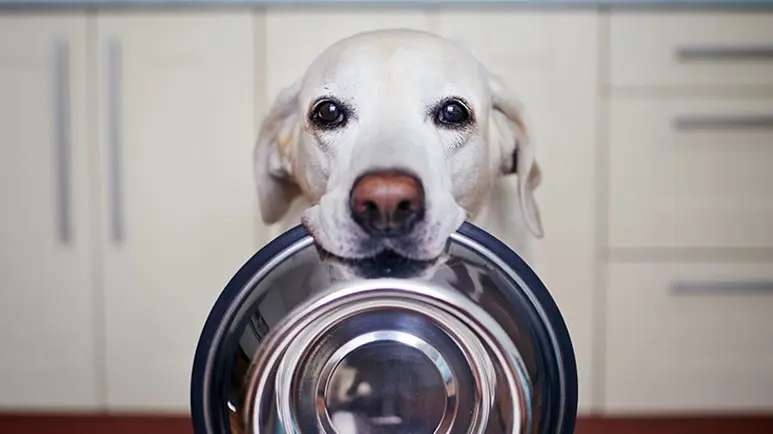Why Can't Your Lab Seem to Stay Full?
Could there be a genetic twist causing your Labrador's insatiable hunger and low energy burn? Discover how this impacts their weight and how you can help them stay healthy.

STORY AT-A-GLANCE
- Veterinary scientists at the University of Cambridge have uncovered a significant contributing factor to overweight and obesity in many Labrador retrievers
- The culprit is a gene mutation that prevents the production of two other hormones important in determining hunger and moderating energy use
- The mutation is carried by about 25% of Labs; it makes them hungrier between meals than dogs without the mutation, and less able to burn off calories from their food
- Probiotic supplementation may be helpful to these Labs — a recent study by researchers in Korea suggests two particular strains of probiotics were remarkably successful in reducing the body fat percentage in dogs
If you’re a dog lover, you may have noticed that many Labrador retrievers are overweight or obese. So many, in fact, that it seems to be breed-related … and indeed, we now know it is, thanks to research by veterinary scientists at the University of Cambridge in the U.K.
The researchers found evidence that a common mutation in these popular dogs causes them to not only be hungrier than the average canine, but also reduces their metabolic rate. Needless to say, always hungry + low metabolism = predisposition to obesity. The study authors published their results in March 2024 in the journal Science Advances.1
A Gene Mutation Appears To Be the Culprit
Labs are full of playful energy and also make wonderful working/service dogs. And while they tend to live relatively long lives at about 13 years on average, they also very often come with an insatiable appetite that when appeased, leads to high rates of obesity.
University of Cambridge scientist and study co-author Eleanor Raffan has been investigating the genetics of obesity and metabolic disease in dogs, and especially in the Labrador as well as a close relative, the flat-coated retriever. In 2016, Raffan and colleagues published a study finding a clear link between obesity in these breeds and a mutation in a gene responsible for the protein pro-opiomelanocortin, or POMC.2 This alteration seems to delete some of the POMC gene in affected dogs.
The researchers found that 25% of Labs and 66% of flat-coated retrievers appear to have this mutation. According to their latest study, the team has figured out the link between POMC mutations and obese retrievers.
POMC Dogs Work Harder for Treats, Burn 25% Fewer Calories
For the present study, the researchers performed experiments in 87 adult pet Labs ranging in size from a healthy weight to a bit overweight. Some of the dogs carried the POMC mutation.
As shown in the above video, in one of the experiments, the dogs ate their normal breakfast, and then exactly three hours later, were led to a clear plastic box containing a delicious sausage. The box had holes so they could see and smell the treat inside. Dogs with the gene mutation tried harder than dogs without it to get the impossible-to-access sausage.
Interestingly, in another experiment in which the Labs were given as many cans of food as they wanted every 20 minutes until they stopped eating, there was no notable difference in how much either group of dogs ate before stopping. This means the dogs with the gene mutation are hungrier in between meals, but don’t need to eat more than other dogs to feel full at mealtime.
“We found that a mutation in the POMC gene seems to make dogs hungrier,” Raffan told HealthDay. “Affected dogs tend to overeat because they get hungry between meals more quickly than dogs without the mutation.”3
In a third experiment measuring body metabolism, the Labs slept in a special chamber that captured the gases they exhaled. The results demonstrated that the POMC dogs had a lower resting metabolic rate than the other Labs, burning around 25% fewer calories.
According to Raffan, the gene mutation creates a “double whammy” in affected dogs, in that they not only want to eat more than other dogs, but also burn less calories from their food, making them more likely to grow overweight or obese.
“Practically, this means that owners of dogs with the mutation need to work particularly hard to keep them slim,” Raffan told Gizmodo in an email. “It is possible, but requires owners to pay attention to what they feed and closing off opportunities for dogs to steal or scavenge extra food.”4
Gene Mutation Prevents Production of Other Hormones
From a biological perspective, it seems the loss of the POMC gene prevents the production of two other hormones in the brain of affected dogs: beta-melanocyte stimulating hormone (β-MSH) and beta-endorphin. These hormones are important in determining hunger and moderating energy use.
Humans produce the same hormones, and apparently there are known genetic disorders linked to a dysfunctional POMC mutation that raise a person’s risk of obesity significantly.
“People are often rude about the owners of fat dogs, blaming them for not properly managing their dogs’ diet and exercise,” Raffan said. “But we’ve shown that Labradors with this genetic mutation are looking for food all the time, trying to increase their energy intake. It’s very difficult to keep these dogs slim, but it can be done.”
Probiotics May Help Overweight Labs
A study published earlier this year by researchers at Seoul National University in Korea identified two strains of probiotics that contribute to weight loss in obese dogs.5 The purpose of the study was to investigate metabolic diseases in companion animals toward identifying probiotics that may show promise as a long-term, safe treatment.
"The initial challenge involved selecting specific metabolic diseases for examination, leading us to focus on the prevalent issue of 'obesity in pets’," study principal investigator Younghoon Kim, Ph.D., professor in the Department of Agricultural Biotechnology, College of Agriculture and Life Science (CALS) stated in an American Society for Microbiology (ASM) press release.6
According to the press release, “one of Kim's primary objectives is to raise awareness about the pressing need for further research on probiotics tailored for pets, emphasizing the vast array of probiotic types that hold potential applications.” Kim believes probiotics present broad therapeutic possibilities for treating a wide spectrum of diseases among companion animals.
Select Probiotic Strains Activate Energy Metabolism
Kim’s team analyzed variations in the intestinal microbiota of young vs. old dogs, which revealed a decline in the population of lactic acid bacteria, specifically Bifidobacterium species and Enterococcus species, in the older dogs. Based on their findings, the researchers decided to investigate these two strains.
In the experimental phase, Enterococcus faecium IDCC 2102 and Bifidobacterium lactis IDCC 4301, along with a high-fat diet, were fed to a group of obese Beagles, with the result that the dogs had a reduction in body fat, and a resolution of imbalances in their intestinal microflora caused by obesity.
According to Kim, the probiotic strains they selected “demonstrated remarkable success in reducing the body fat percentage in dogs.”
"What set these strains apart was their ability to not only limit dietary intake or enhance excretion to reduce body weight but, more importantly, activate energy metabolism,” Kim explained. “Even when exposed to a high-calorie diet, we observed a decrease in body weight, alleviation of subcutaneous fat accumulation and an increase in energy metabolism. This confirmed a shift in the body's metabolic orientation toward fat consumption, rather than fat accumulation."
Body fat accumulation often leads to systemic inflammation and disruption of hormone metabolism. Kim’s study revealed that the dogs fed the selected probiotic strains had lowered inflammation levels and enhanced metabolic activities such as insulin production. In addition, “the researchers successfully increased the proportion of commensal bacteria, which typically reside in the body, acting as a defense against harmful bacteria and boosting immunity.”
Sources and References
- 1 Dittmann, M.T. et al. Science Advances, 6 Mar 2024, Vol 10, Issue 10
- 2 Raffan, E. et al. Cell Metabolism, 2016 May 10;23(5):893-900
- 3 HealthDay, March 7, 2024
- 4 Gizmodo, March 7, 2024
- 5 Kang, A. et al. Microbiology Spectrum, Vol. 12, No. 3, Veterinary Microbiology Research Article, January 25, 2024
- 6 American Society for Microbiology Press Release, January 25, 2024











